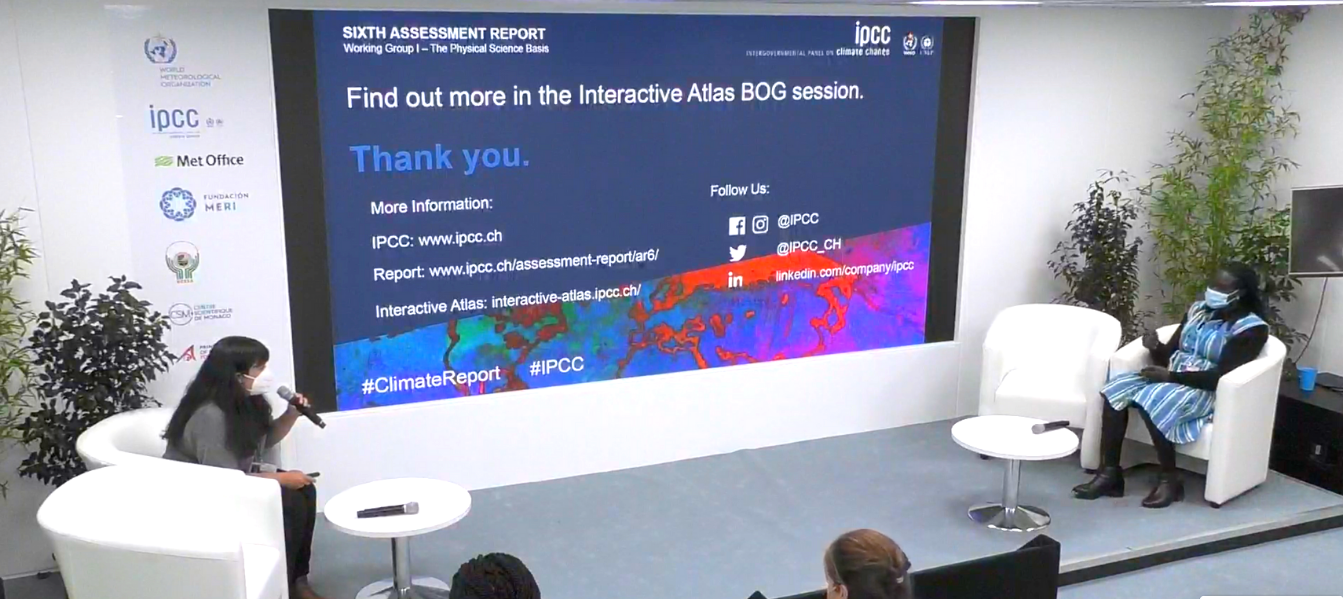
Science Pavilion will host from November 1 to 12 these activities focused on defining the climate problem and outlining the ambition to address climate change
The Instituto de Física de Cantabria (IFCA, CSIC-UC) is this week
at COP26 to support some of the regional events organized by the Intergovernmental Panel on Climate Change (IPCC) from November 1 to 12.
Science Pavilion, run by the UK Met Office, the Intergovernmental Panel on Climate Change (IPCC) and the World Meteorological Organization, has become the hub of COP26 activity to provide the sound scientific evidence needed by negotiating teams around the world to inform their decision-making.
Among the activities planned by IPCC, a total of
six events will show the evolution of the climate (temperature and precipitation variations and their consequences) of the different regions and continents of the planet (Asia, Africa, Europe, North America, Central and South America, and Australasia), together with the demonstration of the Atlas as a major contribution of the institute. From today, IFCA will support these events through a research team of the Institute's Meteorology Group formed by Maialen Iturbide and Jorge Baño, who will offer a demonstration of the Interactive Atlas tool,
presented last August.
This first session focused on highlighting the key messages of the IPCC's Sixth IPCC Report on climate change with a particular focus on Africa. Thus, the common regional climate features observed for the African continent were presented, and several key messages extracted for the 9 African regions and the West African Monsoon were launched.
The Interactive Atlas
IFCA and the University of Cantabria (Dept. of Applied Mathematics and Computer Science) have supported the development of this IPCC Interactive Atlas in the framework of the Interdisciplinary Thematic Platform Climate and Climate Services (PTI-Clima), which integrates CSIC groups, organizations and companies interested in the development of climate services. The technical development of this novel tool has been carried out as a public-private collaboration with Predictia, a Spanish technology-based company.
This participation translates into the human and technical support necessary for the development of the Atlas, a novel product included in the Sixth IPCC Climate Change Report, which allows a flexible spatial and temporal analysis of the results through different dimensions of analysis (e.g., projections of future periods for different scenarios or levels of global warming), using different visual tools for the analysis of global and regional information.
Interactive Atlas includes two components: first, the 'Regional Information', which provides access to climate change information (derived variables and indices) from the main datasets used in the report (global and regional observations and projections: CMIP5, CMIP6 and CORDEX), and second, the 'Regional Synthesis', which summarizes and synthesizes the main results of the report on the regional assessment of climate change for different types of impact-triggering phenomena (heat, droughts, sea level, etc.) in reference regions. The Atlas supports not only the chapters of the report, but also the Summary for Policy Makers with the latter component.
About IPCC
The Intergovernmental Panel on Climate Change (IPCC) is the United Nations body for the assessment of climate change science. It was established by the United Nations Environment Programme (UNEP) and the World Meteorological Organization (WMO) in 1988 to provide political leaders with regular scientific assessments of climate change, its impacts and risks, and to propose adaptation and mitigation strategies. In the same year, the United Nations General Assembly endorsed the action taken by WMO and the United Nations Environment Programme (UNEP) to jointly establish the Intergovernmental Panel on Climate Change. It has 195 member states.
COP26
Opening on October 31 in Glasgow, the conference brings together world leaders, negotiators, scientists, businesses, policy makers and citizens as nations seek to reach agreement on how to tackle climate change. The Pavilion's program of events during this first week of COP26 will focus on defining the climate problem and outlining the ambition to address climate change, and during the second week events will delve into the use of climate information to work towards and support adaptation and resilience in the face of already evident climate change.
Programme
Friday, 5th November 2021: Regional Climate Information: Africa
Saturday, 6th November 2021: Climate change information for the impact and risk assessment in the European region
Saturday, 6th November 2021: Regional Climate Information: Central America, Caribbean and South America
Monday, 8th November 2021: Regional climate Information: Australia, New Zealand and Antarctica
Monday, 8th November 2021: Regional Climate Information: Small Islands
Tuesday, 9th November 2021:Regional Climate Information: North and Central America
